D-1: Difference between revisions
Pbcjohnston (talk | contribs) →Interior Photos: Added captions |
Pbcjohnston (talk | contribs) |
||
| Line 6: | Line 6: | ||
[[File:D-1 build 1.jpg|left|500px]] | [[File:D-1 build 1.jpg|left|500px]] | ||
<div style="text-align: justify;"><span style="color:#00008B">Narwhal under construction at Fore River Shipbuilding, Quincy, MA., May 9, 1908. These boats were built inside a large construction shed, enabling very fast building times. The D-class were single hull submarines that had all of the tankage inside the pressure hull. The Electric Boat design utilized "U-shaped" ballast | <div style="text-align: justify;"><span style="color:#00008B">Narwhal under construction at Fore River Shipbuilding, Quincy, MA., May 9, 1908. These boats were built inside a large construction shed, enabling very fast building times. The D-class were single hull submarines that had all of the tankage inside the pressure hull. The Electric Boat design utilized a patented "U-shaped" ballast tank design amidships, the frames of which can clearly be seen here. The boat's battery cells would sit on the bottom of the "U" with a walking deck installed above the cells, right where the curved top of the tank went vertical. It was a very innovative tank design that provided a lot of internal space. This photo shows only the middle part of the boat, which would become the battery compartments and the control room. The frames for the torpedo room and the engine rooms have not yet been installed. | ||
<small>Photo courtesy of the Submarine Force Library & Museum.</small> | <small>Photo courtesy of the Submarine Force Library & Museum.</small> | ||
| Line 13: | Line 13: | ||
[[File:D-1 build 2.jpg|left|500px]] | [[File:D-1 build 2.jpg|left|500px]] | ||
Another photo taken later on the same day shows progress in building the Narwhal. This view is looking from aft | Another photo taken later on the same day shows progress in building the Narwhal. This view is looking from forward to aft. Just beyond the U-shaped ballast tank structure workers have installed the lower framework that will become the foundations for the engines. In the foreground can be seen the curved frame that will form the gasoline tanks under the torpedo room. | ||
<small>Photo courtesy of the Submarine Force Library & Museum.</small> | <small>Photo courtesy of the Submarine Force Library & Museum.</small> | ||
Revision as of 14:43, 26 October 2023
Under Construction
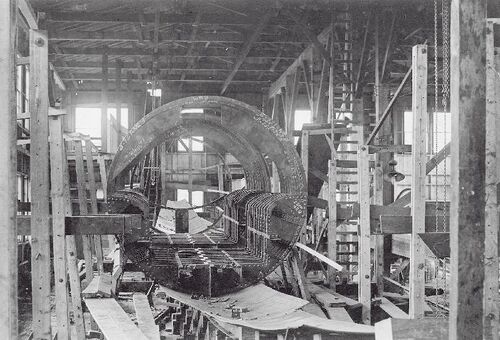
Photo courtesy of the Submarine Force Library & Museum.
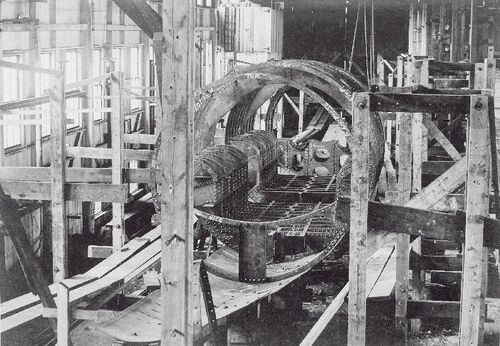
Another photo taken later on the same day shows progress in building the Narwhal. This view is looking from forward to aft. Just beyond the U-shaped ballast tank structure workers have installed the lower framework that will become the foundations for the engines. In the foreground can be seen the curved frame that will form the gasoline tanks under the torpedo room.
Photo courtesy of the Submarine Force Library & Museum.
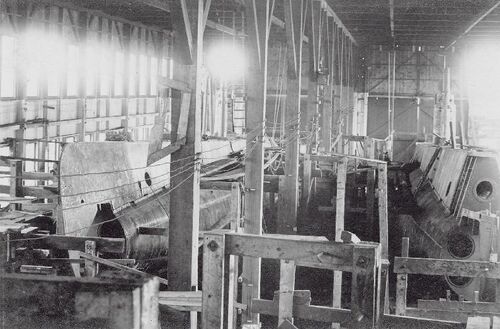
This photo of Narwhal construction was taken 10 months later, on February 7, 1909. Rapid progress has been made. The pressure hull is complete and most of the superstructure has been installed. Narwhal is on the left, Grayling is on the right, in a lesser state of completion. On Narwhal, the superstructure curves around the bow to form the stem, but there is a gap between the stem and the beginning of the pressure hull around the torpedo tubes. The rotating bow cap will be installed there.
Photo courtesy of the Submarine Force Library & Museum.
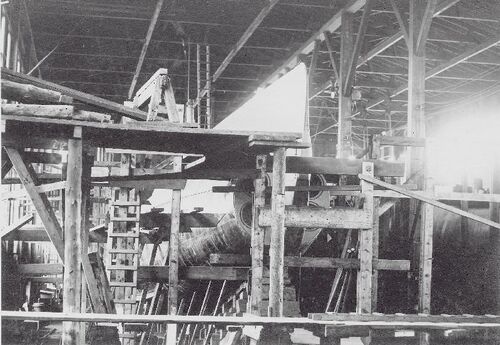
A different view of the same scene above, still with a view of the incomplete bow of Narwhal, February 7, 1909.
Photo courtesy of the Submarine Force Library & Museum.
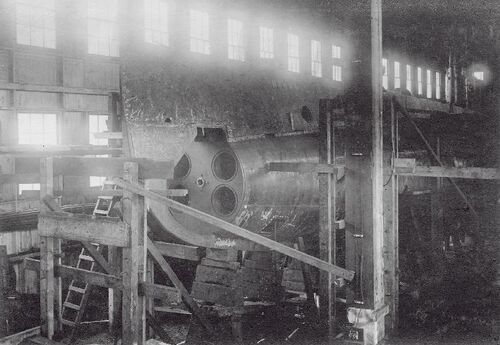
Another angle of the bow area of Narwhal under construction, February 7, 1909. This gives a very clear view of the muzzle end of the torpedo tubes. The streamlined rotating bow cap will be installed later. The cap has two holes in it that will line up with two of the tubes diagonally so that those two tubes can be fired. The cap is then rotated to open up the other two tubes. After firing, the cap is rotated so that the two holes are aligned vertically, and the cap is pulled back and seated firmly so that it seals the muzzle ends of the tubes. The tubes can then be drained and the breech doors inside the torpedo room opened when the boat returns to port. The D-class only carried four torpedoes and no reloads.
Photo courtesy of the Submarine Force Library & Museum.
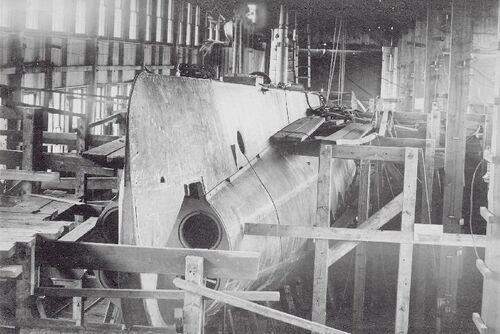
This view of Narwhal's bow while under construction on February 7, 1909 also shows that the conning tower fairwater has been built atop the superstructure in the middle of the boat.
Photo courtesy of the Submarine Force Library & Museum.
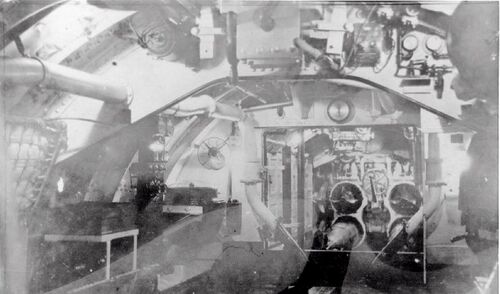
An interior view of Narwhal while under construction at the Fore River Shipbuilding yard in Quincy, MA. This photo was taken on June 12, 1909. The view is from the forward battery area looking forward toward the torpedo room. A large square portion of the torpedo room bulkhead has not yet been installed. See pictures below for what it will look like when complete. The breech doors of the torpedo tubes are open. Yard workers have loaded torpedo "shapes" (inert, non-functioning torpedo simulators) into the tubes to check fit and finish. The two large angled pipes leading upward from the deck right at the bulkhead are battery ventilation pipes that vent hydrogen and heat from the battery while it is being charged. The boat is nearing completion at this point. She would be commissioned five months after this photo was taken.
Photo courtesy of the Submarine Force Library & Museum.
Interior Photos
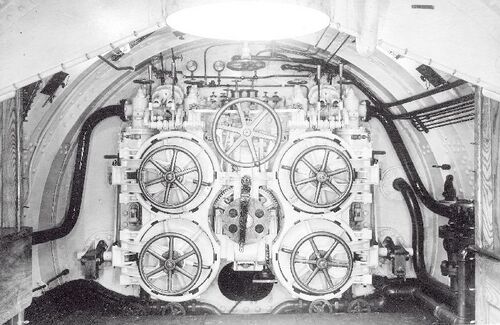
Photo courtesy of the Submarine Force Library & Museum.
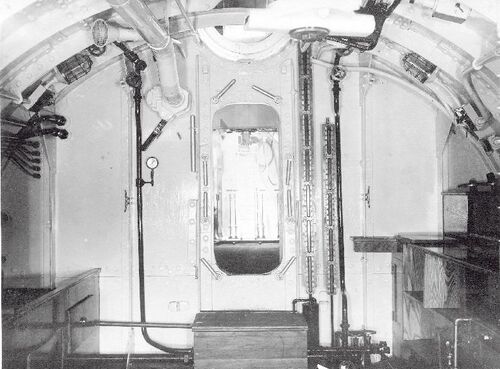
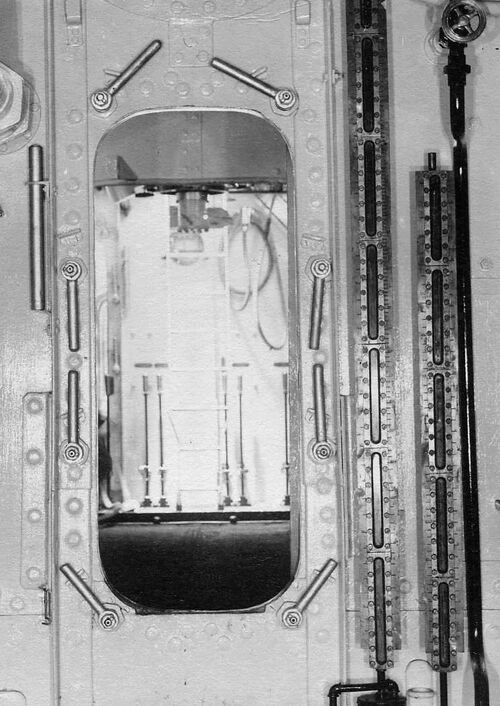
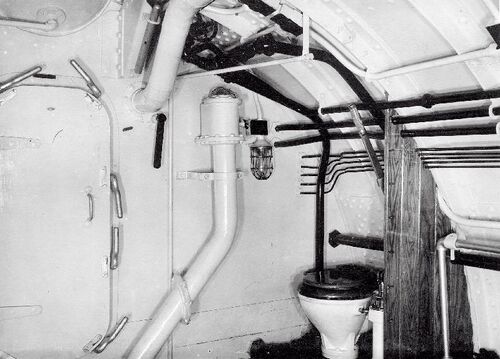
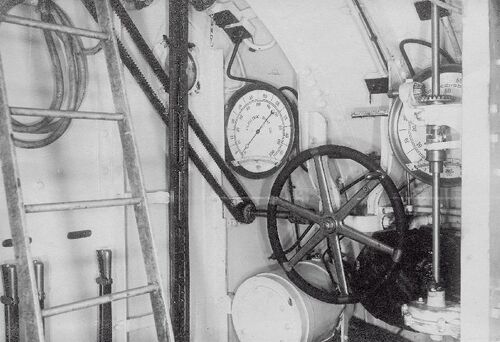
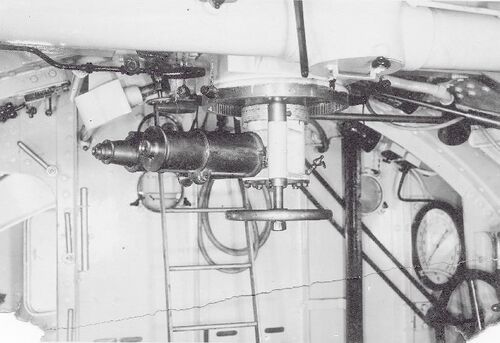
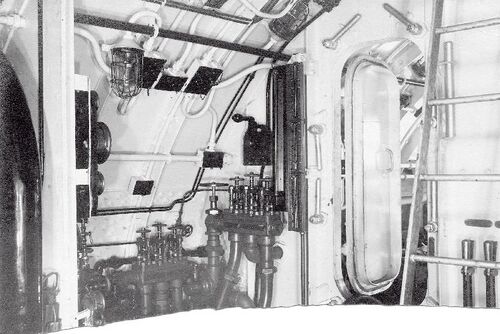
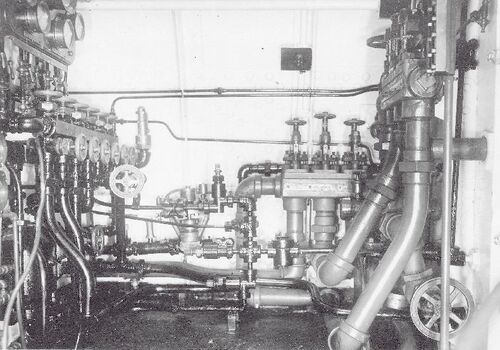
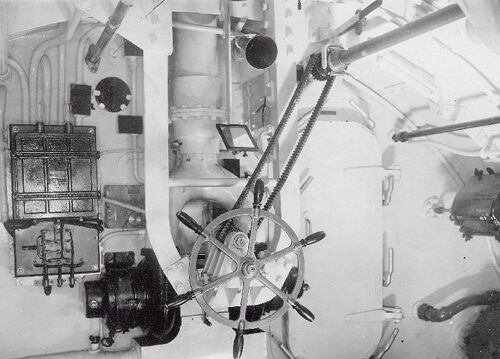
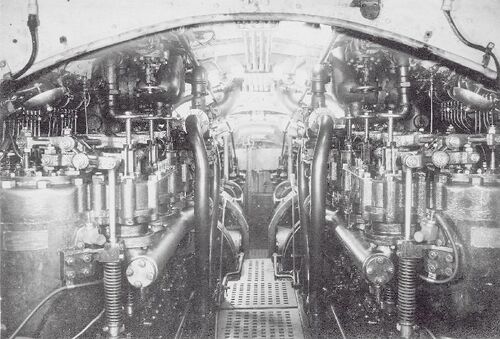
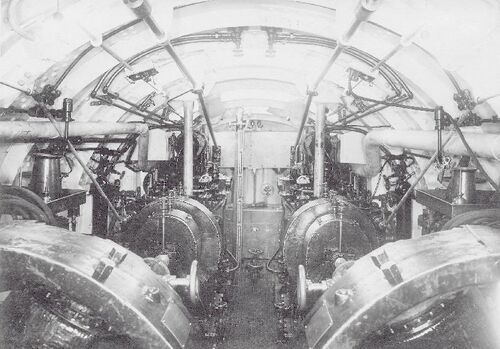
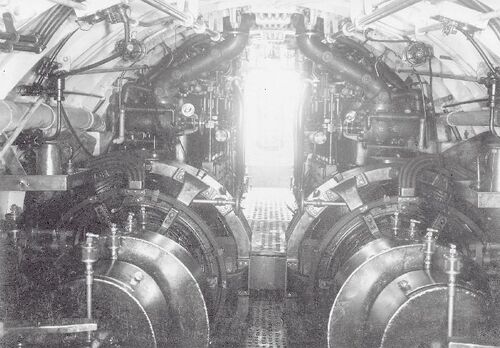
In Service
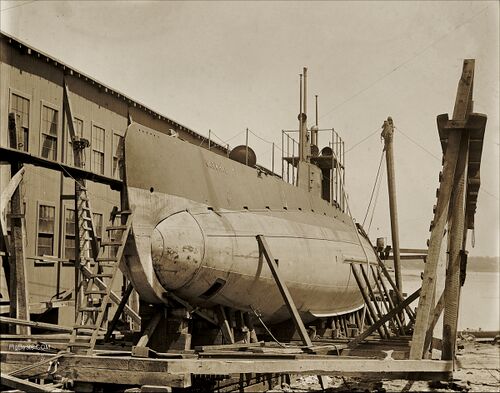
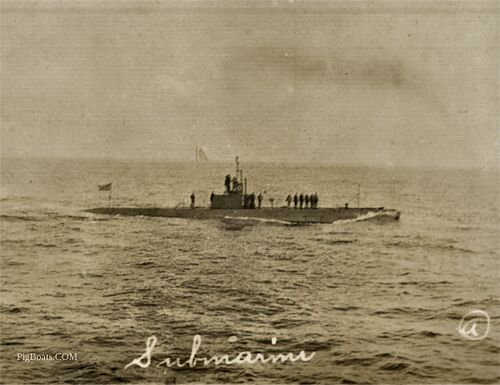
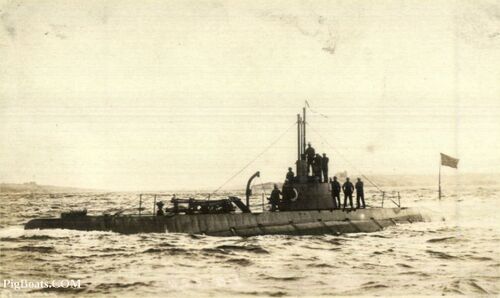
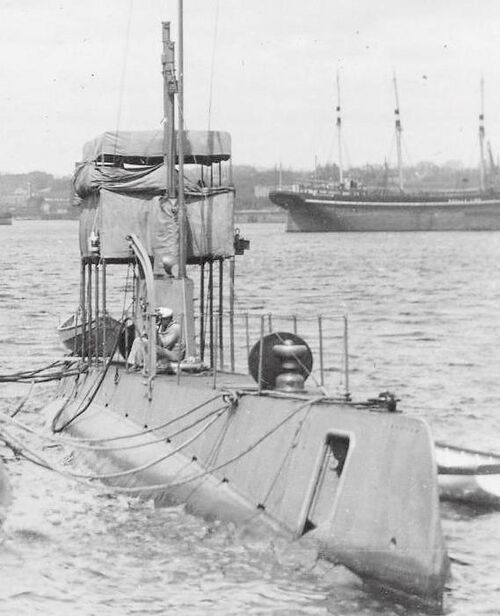
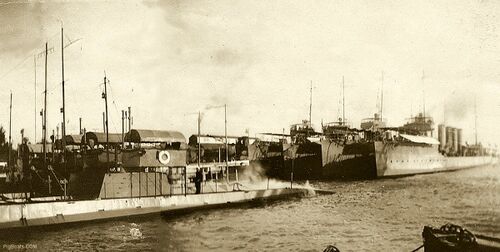
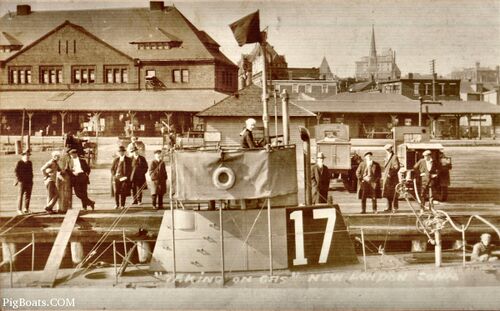
Page created by:
Ric Hedman & David Johnston
1999 - 2023 - PigBoats.COM©
Mountlake Terrace, WA, Norfolk, VA
webmaster at pigboats dot com
